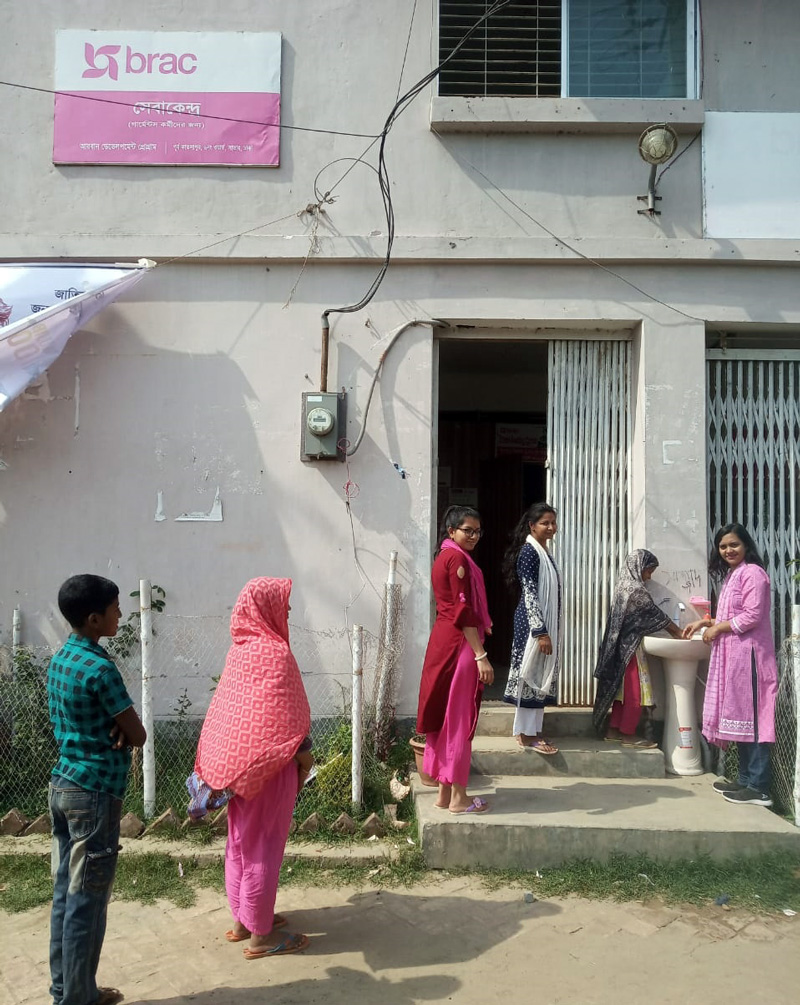Reading Time: 3 minutes
Covid-19 has shut down much of the world.
But for many of us, we are working even harder than before.
Frontline workers, medical staff, care services, supermarket staff, waste management and delivery services are working around the clock to minimise the effect of the virus on the world.
BRAC has over 100,000 frontline staff on the ground. These women and men are in the heart of communities, from urban slums to remote villages, spreading information and providing services to help people to prevent the spread of Covid-19.

Our highest priority, as an organisation, is to keep these people safe – so that they have the best chance of being able to keep us all safe.
Here are 6 steps we are taking to protect them:
1. Forming a global taskforce
The BRAC COVID-19 Global Taskforce consists of public health, communicable diseases and communications experts from BRAC, BRAC International, BRAC USA, and James P Grant School of Public Health, BRAC University. The taskforce is in close contact with international health agencies, including the Center for Disease Control (CDC) and World Health Organization (WHO), and is closely advising the BRAC leadership team.
2. Quick, clear communication to all field offices
Instructions have been sent to all 100,000 regular and non-regular staff in Bangladesh through a circular listing the precautions to be taken for the virus. The circular, signed by BRAC’s executive director, aligned everyone with BRAC’s response to this outbreak.
4,000 awareness banners on symptoms and how to protect against the virus are being displayed at the entry points of all 2,700 field offices across Bangladesh, for staff, clients and participants walking into the offices.

3. Clear instructions and equipment to ensure strong personal hygiene practices
All field offices have been instructed to ensure that staff are practicing proper personal hygiene. Hand washing stations are being set up with soap, tissues, clean towels and water. Staff wash their hands periodically throughout the day; starting from the moment they enter the office. We are conducting online orientation sessions with healthcare experts, developing training modules and mobilised brac.net/covid19, a dedicated web portal to create awareness about the virus.
4. Prioritising health and well-being
Any colleague who is demonstrating symptoms of the virus (fever, cough and/or sneezing) will work from home, with full pay and no leave deduction. All 2,400 staff in the head office have been equipped to work from home until further directions are provided. Staff are requested to practice social distancing, not to attend large gatherings and travel has been restricted until further notice.
5. Reaching every member of the BRAC family with clear messages
All staff have received messages about how to protect themselves and others, including all cooks, cleaners and office assistants. Towels are being changed 3-4 times a day. Regularly used items such as door knobs, tables, chairs, are being cleaned with sanitisers. Cleaning staff are being hired immediately for facilities that did not have them, and additional cleaning staff recruited for larger facilities if needed. Couriers are advised to refrain from unnecessary travelling.
6. Giving control over decisions to field operations
Special field-level committees have been formed, and authorised to take decisions about the purchasing of cleaning and hygiene materials, awareness building, and monitoring overall health and safety. Committees consist of managers from all of BRAC’s programmes, BRAC district representatives, human resources, and accounts.
Organisations play a crucial role in preventing the spread of Covid-19 by ensuring their employees are aware and protected.
It is vital to keep in constant communication, respond to questions, and leave no space for confusion or panic.
It takes all of us to build a world that is safe for all of us.
Sarah-Jane Saltmarsh is the head of programme and enterprise communications, BRAC Communications, Zaian Fatema Choudhury is a communications specialist for BRAC Communications and Tahjib Shamsuddin is a communications specialist for BRAC’s microfinance and ultra-poor graduation programmes.





